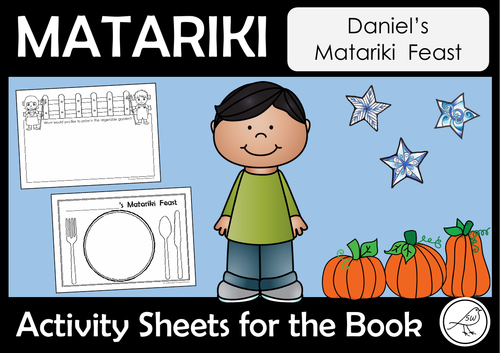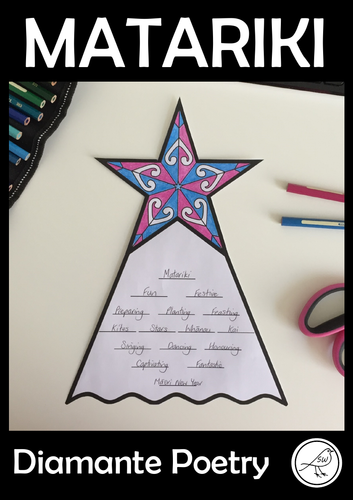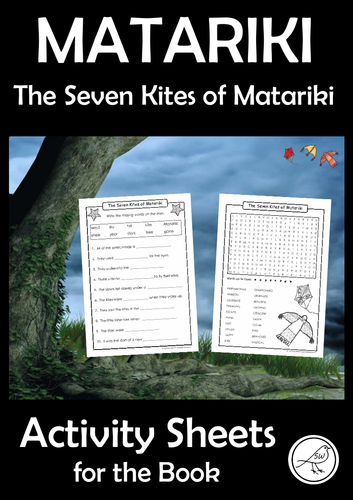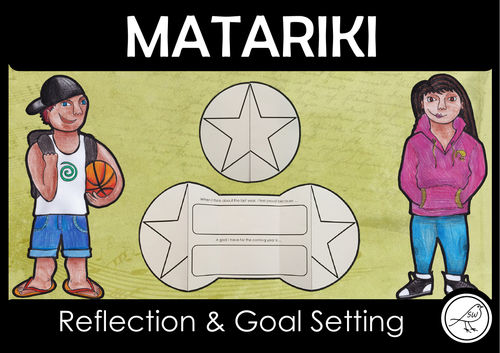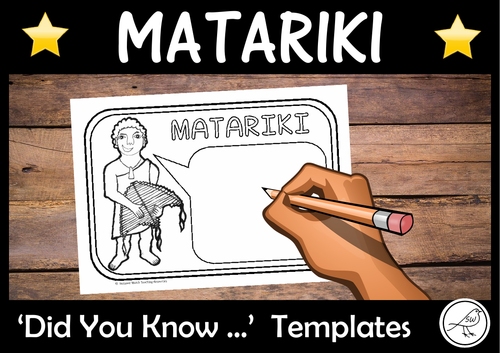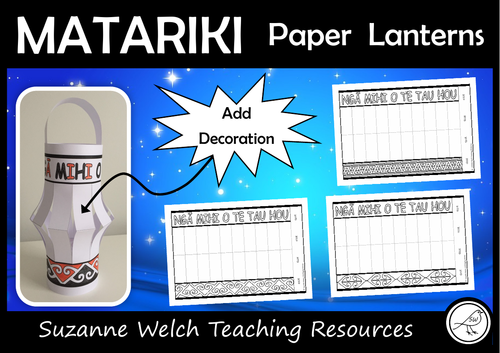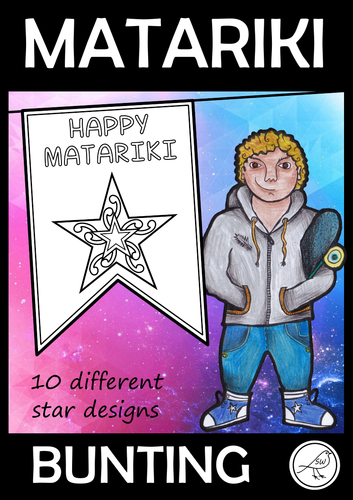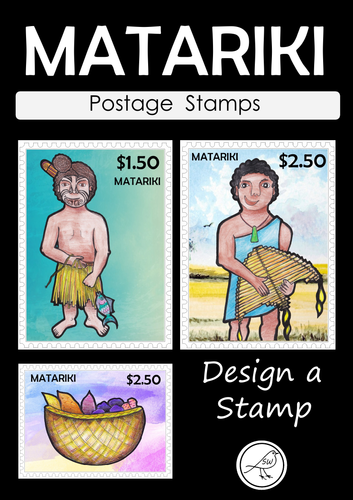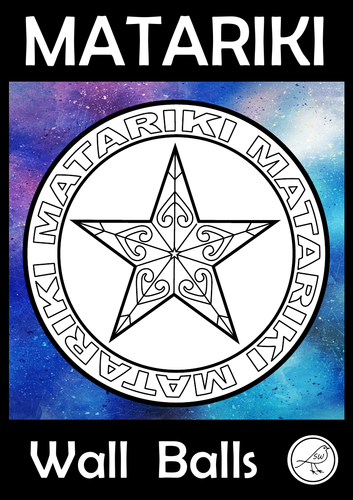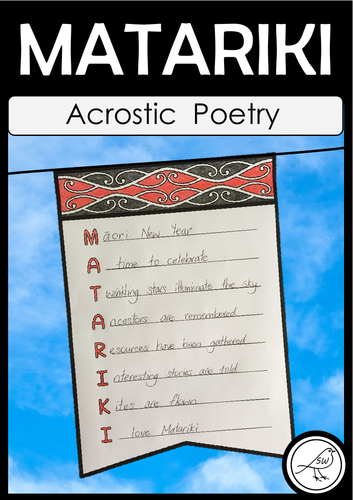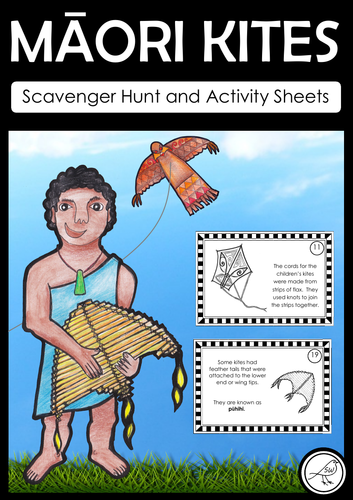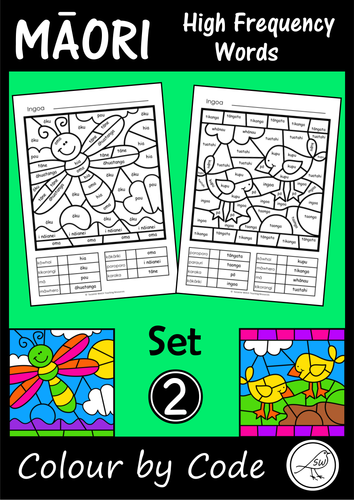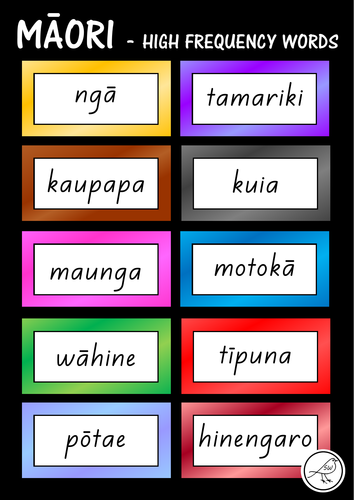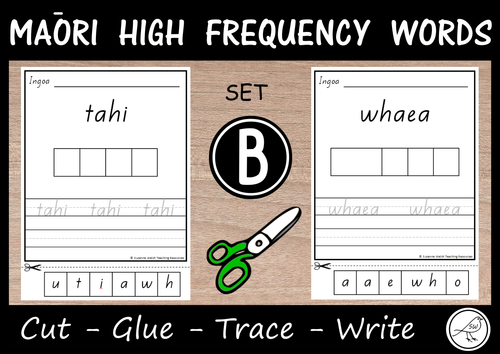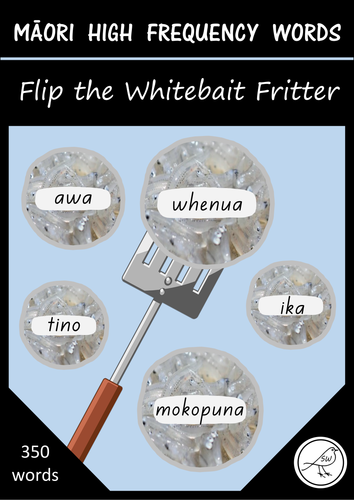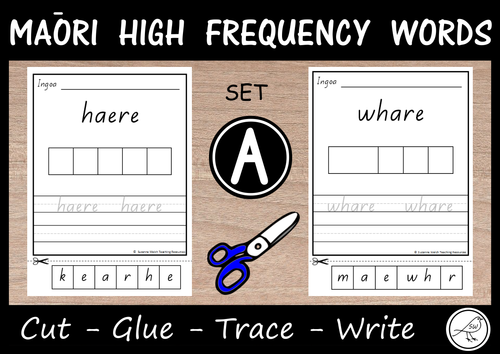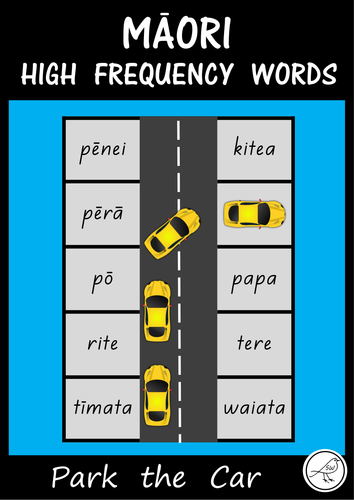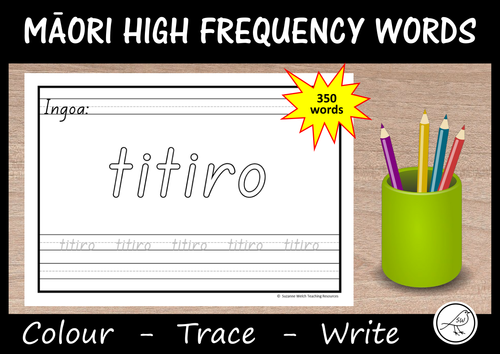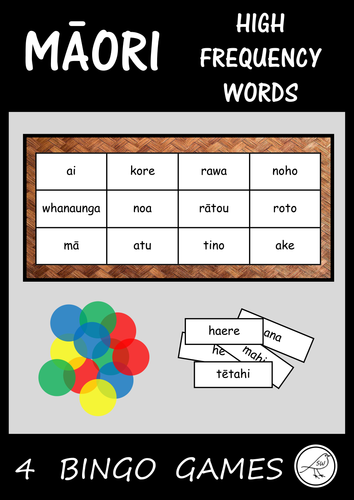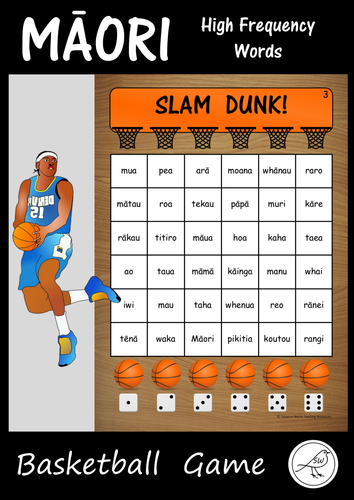
377Uploads
164k+Views
10k+Downloads
World languages

Matariki – Daniel’s Matariki Feast – Activity sheets for the book
A set of six activity sheets for using with junior students after reading the following book:
TITLE: Daniel’s Matariki Feast
AUTHOR: Rebecca Beyer and Linley Wellington
ILLUSTRATOR: Christine Ross
Included:
♦ Draw what you’d like to have for a Matariki feast.
♦ Draw what you’d like to grow in the vegetable garden.
♦ Colour, trace and write the word ‘Matariki’. Fill in the letter boxes and connect the letters with a line. Draw a picture that shows how you’d like to celebrate Matariki.
♦ Printing practice – trace the words: ‘Matariki is a good time to start something new. I would like to …’ then draw a picture to show your answer.
♦ Design a new cover for the book.
♦ Word graph. Circle and count the words, record on the block graph and write the number underneath.
**********************************************************************
© Suzanne Welch Teaching Resources

Matariki – Diamante Poetry
Celebrate the Māori New Year with this fun poetry writing activity.
The Diamante Poem looks at nouns, verbs, adjectives and synonyms so it is the perfect writing activity to compliment your word work programme. There are two different frameworks included in this resource.
Included:
♦ 2x Framework charts
♦ 2x Student handouts (for drafting their writing on). 2 per A4 page.
♦ 1x Example poem (Matariki)
♦ 5x Publishing templates
♦ Publishing template with blank star (students design their own)
The published poems look great cut out and displayed on the classroom wall.
Made on A4 size paper.
**********************************************************************
© Suzanne Welch Teaching Resources

Matariki – The Seven Kites of Matariki – Activity Sheets for the book
A set of activity sheets for the following book:
Title: The Seven Kites of Matariki
Author: Calico McClintock
Illustrator: Dominique Ford
21 activity sheets that suit a range of abilities.
Included:
♦ Word search – junior and senior
♦ Cloze – junior and senior (write the missing words)
♦ Order the events in the story (cut and paste activity)
♦ Letter boxes
♦ Acrostic poem templates (Ururangi / Matariki)
♦ Story board – with and without words
♦ Maths – tally chart and block graph (favourite kite in the story)
♦ Design a kite (template)
♦ Alphabetical order (shells)
♦ Research and drawing task (shells)
♦ Character traits of Ururangi
♦ Drawing task – as if looking through binoculars
♦ Trifold – beginning, middle and end
♦ Postage stamp design
♦ Book cover design
♦ Writing - Newspaper article
♦ Writing – If I was a kite I would …
Answer sheets are provided for:
♦ word search (x2)
♦ ordering the events
♦ cloze (x2)
Made on A4 size paper.
**********************************************************************
© Suzanne Welch Teaching Resources

Matariki – Reflection and Goal Setting Foldable
Celebrate the Māori New Year with this fun foldable.
Matariki is a time to reflect on the year that has passed, and to set new goals for the year ahead.
Colour the star and the background. Write in the middle piece. Cut around the outside and make 4 folds.
There are 6 different options for the reflection / goal setting piece in the middle. The wording is listed below:
Option 1:
When I think about the last year, I feel proud because …
A goal I have for the coming year is ...
Option 2:
A goal I have for the coming year is ...
Something I can do to help me achieve this is ...
Option 3:
Three goals I have for the coming year are ...
Option 4:
This is a picture of my goal.
Option 5:
Words that describe the year that has just passed:
Option 6:
The best thing about the year that has just passed was:
Approximately 12 cm in diameter when folded.
Designed on A4 size paper.
**********************************************************************
© Suzanne Welch Teaching Resources

Matariki – Did You Know … Writing Templates
A selection of templates for your students to record their learning about Matariki. Write a ‘Did you know …’ fact in the speech bubble then colour the picture and decorate the heading and border.
2 Formats:
♦ Blank speech bubble
♦ Speech bubbles with lines for writing
10 Templates:
♦ 5 boy/man
♦ 5 girl/woman
Made on A4 size paper (landscape orientation).
**********************************************************************
© Suzanne Welch Teaching Resources

Matariki - Paper Lantern Craft
Celebrate the Māori New Year with this fun craft activity.
There are 6 different templates for you and your students to select from. Each template has the heading ‘Ngā mihi o te Tau Hou’ (Happy New Year) and a decorative panel at the base. Students add their own creative touch to the middle section.
There is also one template that just has the heading (no decorative panel at the base).
Use the handle template, or just cut strips of paper to cut down on photocopying.
Designed on A4 size paper.
Information and easy-to-follow instructions are included.
These templates can also be used during the Christmas season.
Happy New Year!
**********************************************************************
© Suzanne Welch Teaching Resources

Matariki Bunting
Celebrate the Māori New Year with this cool bunting. A colourful, festive addition to your classroom during Matariki.
Colour, cut and hang! (Cut the top piece off if you don’t want to hang them).
Included:
♦ 10 different star designs
♦ 1 blank star (design your own)
Designed on A4 size paper.
Each template is the size of a piece of A4 paper. You can easily reduce them to A5 size if necessary.
**********************************************************************
© Suzanne Welch Teaching Resources

Matariki – Stamps
20 Matariki themed postage stamps to adorn your classroom walls while celebrating the Māori New Year.
Blank templates to design your own stamp. For example:
♦ what image comes into your mind when you think about Matariki?
♦ what are you doing with your family/friends to celebrate Matariki? (or would like to do).
♦ an image from a story you have read while learning about Matariki.
♦ a decorative star.
Please note that the stamps do not contain the word NEW ZEALAND or AOTEAROA, like a regular postage stamp would. This was simply a design decision I made as I felt the stamps looked too cluttered with it.
Designed on A4 size paper.
**********************************************************************
© Suzanne Welch Teaching Resources

Matariki – Wall Balls
Celebrate the Māori New Year with these wall balls. Designed for your students to colour, cut and display on your classroom walls, but you can do whatever you wish with them.
Included:
♦ 10 different star designs.
♦ 1 blank star (students design their own star).
♦ Large circle (with and without lines). This has been provided in case you would like to make a booklet or something where you want a page at the back.
Ideas:
♦ display on the wall.
♦ attach it to some writing (eg write a poem in the circle at the back).
♦ attach to some card and hang from the ceiling. Perhaps add something else to the other side (art work, writing, etc).
Once cut, they measure approximately 18cm in diameter.
Designed on A4 size paper.
**********************************************************************
© Suzanne Welch Teaching Resources

Matariki - Acrostic Poetry
Celebrate the Māori New Year with this fun writing activity.
Write an acrostic poem on the bunting, colour the strip of pattern, cut it out and hang. (Simply trim the flap off if you don’t want to display it as bunting).
Each of the 5 words are written on 10 different templates. There are 50 pages altogether, just print the ones you want to use.
The Words:
MATARIKI
PUANGA
PLEIADES
NEW YEAR
STARS
The Templates:
♦ 9 different pattern strips
♦ Blank – design your own pattern
Made on A4 size paper.
**********************************************************************
© Suzanne Welch Teaching Resources

Matariki – Traditional Māori Kites
A scavenger hunt and activity sheets for learning about Māori kites (manu tukutuku) from long ago.
All of the information used in this resource was sourced from books and the internet.
The Scavenger Hunt:
Place the cards around the room. Your students walk around with a question sheet and they read the information on the cards to answer the questions. The cards have numbers that correspond to the question numbers.
♦ 22 information cards (2 per A4 sheet).
♦ Student question sheet (they write the answers on this too)
♦ Answer sheet (for marking)
I have written the information in ‘kid speak’ to the best that I could. The font is size 20 so it can be read from a bit of a distance. The answers that your students record are all simple answers (1-2 words). I would estimate the required reading age to be 8+ years (for independent reading of the cards). Lower ability students can buddy up with a friend during the scavenger hunt if necessary. All of the cards are ink-friendly black and white.
Of course, you don’t have to use the cards as a scavenger hunt. They can be used for whatever purpose you wish.
Chart:
An A4 size chart that shows 6 reasons why Māori made and flew kites.
Pictures:
4 coloured pictures (A4 size) that were hand drawn by a NZ artist (based on her interpretation). Use these on a wall display or as an aid for learning. The same pictures (in black and white) have been used throughout this resource.
Activity Sheets:
♦ Word search.
♦ Venn diagram (comparing/contrasting Māori kites with modern day kites).
♦ Acrostic poem (kites / manu tukutuku).
♦ Letter boxes (word work activity).
♦ Kite design (design a kite and list equipment needed).
♦ Did you know … (write information in the speech bubble.
♦ Graphic organisers (for students to present research information on).
♦ Senses (what did they look/smell/feel/sound like?)
♦ Postage stamp design
♦ Trifold (for students to present research information on).
♦ Diorama (for students to present research information on).
♦ Flip flap (variety of uses).
♦ Interview questions (write questions you would like to ask an expert about).
♦ Kites ‘can/have/are’ graphic organiser.
♦ Procedural writing template – how to make a kite.
Made on A4 size paper.
**********************************************************************
© Suzanne Welch Teaching Resources

Māori High Frequency Words - Colour by Code – Set 2
A set of 10 activity sheets for students working on reading high frequency sight words in Te Reo Māori.
Colour the words according to the code to reveal a mystery picture.
The words used in this resource are sourced from a list on TKI called ‘1000 frequent words of Māori – in frequency order’. This set contains a selection of words from those listed in the 101-200 group.
Set 2a – 5x activity sheets (a selection of words from 101-150)
Set 2b – 5 x activity sheets (a selection of words from 151-200)
Included:
♦ 10 activity sheets
♦ 10 answer sheets
♦ Colour chart to help your students read the colour words
Each worksheet has a space for your students to write their name.
A ‘colour swatch’ box is included next to the colour word to help your students work on this activity with independence.
Words Used – Set 2a:
♦ CHICKS - tāngata, taonga, pō, ingoa, kupu, tikanga, whānau, tuatahi
♦ BIRD - kāre, arā, pā, raro, waiata, pea, pēnei, mua
♦ MONKEY - tīmata, tika, rere, ahakoa, pātai, mere
♦ OCTOPUS - mehemea, kotahi, moana, matua, toa, hanga, hiahia
♦ BARN - tama, tākaro, rite, tere, momo, ora, rongo
Words Used – Set 2b:
♦ BEACH - ika, rōpū, toru, tangi, anake, tinana, pakeke
♦ DUCK - marama, wāhanga, karanga, tuna, whakataetae, pukapuka, take, konei
♦ BREAKFAST - ringa, āe, ehara, awa, ērā, āwhina, pēhea
♦ BEAR - waho, rau, iti, Ngāti, maha, kuia, tahi, pango
♦ BUG - hia, ōku, pou, āhuatanga, oma, i nāianei, tāne
Please note that these pictures are also used in my NZ Sight Word resources (English).
This resource has been created to support Māori medium education in Aotearoa. A helpful resource for full immersion and bilingual classes.
**********************************************************************
© Suzanne Welch Teaching Resources

Maori High Frequency Words - 500 words on individual cards
500 high frequency Māori words.
♦ Written in order of frequency.
♦ 10 words per page.
♦ Grouped into sets of 50 - each set has a different coloured border.
The font used is ‘NZ Basic Script’.
** Please note that English translations are not included.
These words are also available as word cards - 10 words on each card. These cards are also available in my TES store.
**********************************************************************
© Suzanne Welch Teaching Resources

Māori High Frequency Words – Cut, Glue, Trace, Write – Set B
Activity sheets for learners working on high frequency Māori words.
This resource contains 100 different words.
Tasks:
♦ write your name
♦ read the word
♦ cut the letter tiles out and throw away any you don’t need
♦ glue the letter tiles in the correct boxes
♦ trace the word
♦ write the word
The lines for writing on are standard junior size (14mm with a 7mm dashed line). The font used is ‘NZ Basic Script’. The letter shapes are the same as those recommended in the NZ Ministry of Education Handbook – ‘Teaching Handwriting’.
There are two A5 size worksheets on each A4 size page. The same word is used on each sheet for your printing convenience.
This resource has been created to support Māori medium education in Aotearoa. A helpful resource for full immersion and bilingual classes.
The words in this resource (Set B) are the second 100 words in the list on TKI that contain 1-6 letters.
Examples of words used:
moana, kupu, ahakoa, ora, rongo, waiata, hiahia, awa, heke, rōpū, marama, konei, tinana, tāne, pou, pēnei.
Set A is also available (the first 100 words). Available in my store.
**********************************************************************
© Suzanne Welch Teaching Resources

Māori High Frequency Words – Flip the whitebait fritters
A fun hands-on activity that will help your learners to read a wide range of high frequency Māori words.
Print and laminate the whitebait fritters. Students use a kitchen spatula to flip the word over.
Ideas:
• Read the word out loud and flip it over with a kitchen spatula.
• Read the word out loud and use a kitchen spatula to place the fritter in/out of a frying pan. (Use a real frying pan or use the one included).
• Be the first person to flip the fritter over with your kitchen spatula when the teacher calls the word (small group activity).
• Have a selection of fritters and arrange them like a BINGO card. Flip the fritter over when the teacher calls a word that you have. The first person to have all of their fritters turned over is the winner.
• Use them as a wall display.
• Print out 2 sets and play a memory game (matching pairs) with them. Turn the fritters face down. Take turns at flipping 2 fritters over. If they match you keep the fritters, if not it’s the next person’s turn.
• Read the word on the fritter. Write it down and then flip it.
Included:
♦ 350 whitebait fritters
♦ Blank template (for additional words if necessary)
♦ Teacher notes
♦ Fry pan
6 whitebait fritters on each A4 size page.
The font used is ‘NZ Basic Script’. The letter/number shapes are the same as those recommended in the NZ Ministry of Education Handbook – ‘Teaching Handwriting’.
This resource has been created to support Māori medium education in Aotearoa. A helpful resource for full immersion and bilingual classes.
Examples of words used: ngā, tētahi, mahi, reira, waka, whenua, pikitia, rua, tuatahi, rongo, karanga, āwhina, waho, kau, hua, tamaiti, ngahere, ako, paku, māna, whakahaere.
For a full list of the words used in this resource please go to the tki website listed above. They are the first 350 words in frequency order (te to oho)
**********************************************************************
© Suzanne Welch Teaching Resources

Māori High Frequency Words – Cut, Glue, Trace, Write – Set A
Activity sheets for learners working on high frequency Māori words.
This resource contains 100 different words.
Tasks:
♦ write your name
♦ read the word
♦ cut the letter tiles out and throw away any you don’t need
♦ glue the letter tiles in the correct boxes
♦ trace the word
♦ write the word
The lines for writing on are standard junior size (14mm with a 7mm dashed line). The font used is ‘NZ Basic Script’. The letter shapes are the same as those recommended in the NZ Ministry of Education Handbook – ‘Teaching Handwriting’.
There are two A5 size worksheets on each A4 size page. The same word is used on each sheet for your printing convenience.
This resource has been created to support Māori medium education in Aotearoa. A helpful resource for full immersion and bilingual classes.
The words in this resource (Set A) are the first 100 words in the list mentioned on TKI that contain 1-6 letters.
Examples of words used:
ki, ngā, mai, mahi, ahau, whare, kura, māori, haere, koutou, reo, whai, mua, anō, ia, kōrero.
Set B is also available (this has the next 100 words). Available in my store.
**********************************************************************
© Suzanne Welch Teaching Resources

Māori High Frequency Words – Park the car
A set of ‘Park the car’ activity sheets for 350 high frequency Māori words.
A great hands-on literacy activity that will engage many of your students (particularly your boys). Drive a toy car and park it on the correct word.
There are 35 carparks (A4 sheets) that list the words in frequency order.
Included:
♦ Set 1 – white carparks
♦ Set 2 – grey carparks
♦ Blank templates included so you can custom design a car park for your students.
♦ Car pictures (these may be used as a temporary solution if you don’t have any toy cars)
♦ Teacher notes / suggestions for use.
Words are written with the NZ Basic Script font.
• More than one car park can be lined up to make it more challenging.
• The sheets are numbered from 1-35.
• You can send a ‘car park’ home with your students as an alternative way of reinforcing high frequency word learning at home.
• Reluctant readers may feel more encouraged to participate if they bring in a toy car from home to use. Perhaps link it to a writing activity as well.
• It doesn’t have to be a toy car … it could be a truck, motorbike, horse etc.
This resource has been created to support Māori medium education in Aotearoa. A helpful resource for full immersion and bilingual classes.
Examples of words used: ngā, tētahi, mahi, reira, waka, whenua, pikitia, rua, tuatahi, rongo, karanga, āwhina, waho, kau, hua, tamaiti, ngahere, ako, paku, māna, whakahaere.
For a full list of the words used in this resource please go to the tki website listed above. They are the first 350 words in frequency order (te to oho)
**********************************************************************
© Suzanne Welch Teaching Resources

Māori High Frequency Words – Colour, Trace and Write
350 worksheets for your students to practise reading, spelling and writing high frequency Māori words.
• write your name.
• colour the word.
• trace the word (light grey font).
• write the word independently.
The size of the writing lines are standard for juniors (14mm with a 7mm dashed line).
The font used is ‘NZ Basic Script’. The letter shapes are the same as those recommended in the NZ Ministry of Education Handbook – ‘Teaching Handwriting’.
A4 size paper.
This resource has been created to support Māori medium education in Aotearoa. A helpful resource for full immersion and bilingual classes.
Examples of words used: ngā, tētahi, mahi, reira, waka, whenua, pikitia, rua, tuatahi, rongo, karanga, āwhina, waho, kau, hua, tamaiti, ngahere, ako, paku, māna, whakahaere.
For a full list of the words used in this resource please go to the tki website listed above. They are the first 350 words in frequency order (te to oho)
**********************************************************************
© Suzanne Welch Teaching Resources

Māori High Frequency Words - BINGO
This resource contains 4 different BINGO games that are made with the first 200 high frequency Māori words. Each game contains 50 words.
The Games:
♦ Game 1 - words 1-50
♦ Game 2 - words 51-100
♦ Game 3 - words 101-150
♦ Game 4 - words 151-200
Each Game Includes:
♦ word cards (print and cut)
♦ 15 x coloured BINGO mats
♦ 15 x black/white BINGO mats
The coloured mats have a woven texture border. . The borders are the same as those used on my WORD CARDS. A black/white set of BINGO mats are also provided. If desired, your students could decorate the borders on these mats to personalise them.
♦ 3 BINGO mats on each A4 size page
♦ 12 words on each BINGO mat
This resource has been created to support Māori medium education in Aotearoa. A helpful resource for full immersion and bilingual classes.
Examples of words used: haere, tētahi, korero, ki, rawa, au, reira, reo, taea, whare, whakaaro, tekau, moana, tāngata, rongo, ingoa, hiahia, kitea, karanga, tuna, tangi, ehara, huarahi, pou.
For a full list of the words used in this resource please go to the tki website listed above. They are the first 200 words in frequency order (te to āhuatanga)
**********************************************************************
© Suzanne Welch Teaching Resources

Māori High Frequency Words – Basketball Game
‘Slam Dunk’ is a super-fun basketball themed game that will help your students practise reading high frequency Māori words.
There are 10 different game boards that contain the first 360 words of a list on TKI called ‘1000 frequency words of Māori – in frequency order’.
Included:
♦ 10 x coloured game boards
♦ 10 x black/white game boards
♦ Instructions
The words are written in frequency order and the games are numbered 1-10 in the top right corner.
How to Play:
Equipment Needed: one dice, 6 counters and one game board per player.
Players take alternate turns.
1. Place one counter on each of the 6 basketballs.
2. Roll the dice.
3. Find that number underneath the basketball and move that counter to the first word. Read the word out loud before placing your counter on top of it. The other player(s) checks you have read it correctly.
4. Continue in this way, moving a counter up one more space each time.
♦ Who is the first person to score a slam dunk? (when a counter reaches the basketball net at the top of the gameboard).
♦ Who is the first person to score all 6 slam dunks?
This resource has been created to support Māori medium education in Aotearoa. A helpful resource for full immersion and bilingual classes.
**********************************************************************
© Suzanne Welch Teaching Resources

